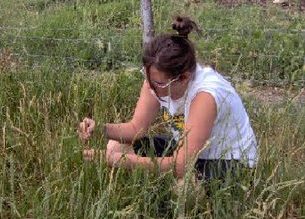Carbon County Hay Certification Program
There is a growing demand in Carbon County for the use of certified weed free forage and mulch as a preventative program in integrated Weed Management Systems to limit the spread of noxious weeds. The goal of this program is to provide a guideline to set minimum requirements for uniform participation across the country. Certified hay reduces the spread of noxious weeds and assists in the management of invasive species. If you would like to participate in the program, please contact a CCWP representative to schedule a time for field inspection.
There is a cost of $1.00 per acre OR a $25.00 minimum.

Carbon County participates in and utilizes the
North American Weed Free Forage Standards and Guidelines.
THESE STANDARDS ARE DESIGNED:
- to provide assurance to all participants that forage certified through this program meets a minimum acceptable standard.
- to provide continuity between the various provinces and states participating in the program.
- to limit the spread of noxious weeds through forage and mulch.
MINIMUM STANDARDS
1. Forage shall be free of those noxious weeds or undesirable plant species (call for list) and those weed declared noxious within the state of origin.
2. Forage shall be inspected in the State/Province of origin by proper officials or authority.
3. Forage shall also be inspected in the field of origin (field shall include surrounding ditches, fence rows, roads, easement, rights-of-way, or a buffer zone surrounding the field.)
4. Field shall be inspected prior to cutting or harvesting by the proper officials or authority.
5. Forage which contains any noxious weeds, or undesirable plant species may be certified if the following requirements are met:
a. Field upon which the forage was produced was treated to prevent seed formation or seed ripening to the degree that there is no danger of dissemination of the seed, or any injurious portion thereof from such noxious weeds, or undesirable plant species, or the propagating parts of the plant are not capable of producing a new plant.
b. Noxious weed(s) or undesirable plant species was treated not later than rosette to bud stage, or boot stage for grass species classified as weeds, prior to cutting or harvesting.
c. Treatment method can include but is not limited to: 1) burning, 2) mowing, cutting or rouging, 3) mechanical methods, or 4) chemicals.
6. An inspection certificate shall document that the above requirements have been met (1..4) based upon a reasonable and prudent visual inspection.
7. Interstate shipment of forage shall be accompanied by an original transit certificate issued by proper officials or authority in the state/province of origin. Shipments into restricted areas not accompanied by the proper transit certificate may be rejected. Use of the standard North American certification marking is recommended.
8. Pellets and pelleted milled feeds may be certified in the field or may be certified based on official testing by a state/province seed lab for weed seed viability. Proof of results shall be submitted to the State/Province Department of Agriculture.
9. Using a transit certificate or certification marking for forage from fields other than the one specified shall constitute a violation of the North American Weed-Free Forage Standards and local authorities may take actions.
